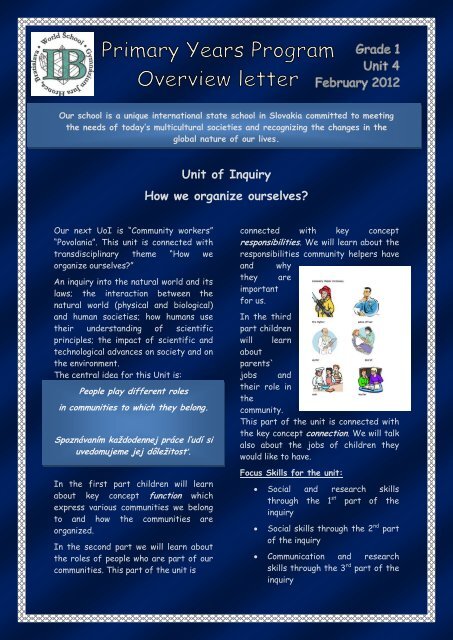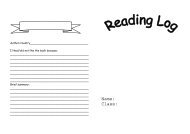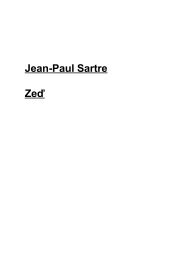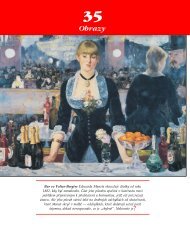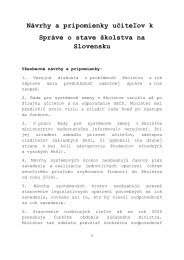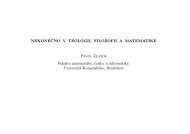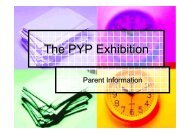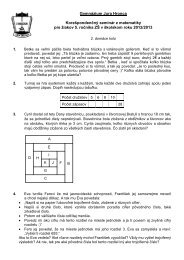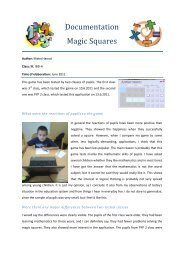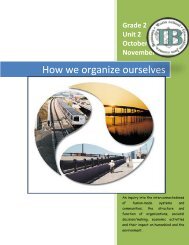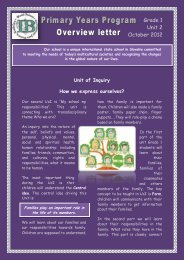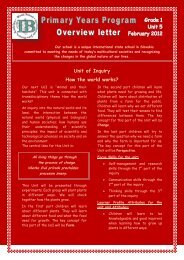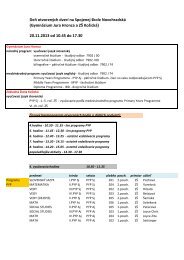Unit of Inquiry How we organize ourselves?
Unit of Inquiry How we organize ourselves?
Unit of Inquiry How we organize ourselves?
- No tags were found...
Create successful ePaper yourself
Turn your PDF publications into a flip-book with our unique Google optimized e-Paper software.
Our school is a unique international state school in Slovakia committed to meetingthe needs <strong>of</strong> today’s multicultural societies and recognizing the changes in theglobal nature <strong>of</strong> our lives.<strong>Unit</strong> <strong>of</strong> <strong>Inquiry</strong><strong>How</strong> <strong>we</strong> <strong>organize</strong> <strong>ourselves</strong>?Our next UoI is “Community workers”“Povolania”. This unit is connected withtransdisciplinary theme “<strong>How</strong> <strong>we</strong><strong>organize</strong> <strong>ourselves</strong>?”An inquiry into the natural world and itslaws; the interaction bet<strong>we</strong>en thenatural world (physical and biological)and human societies; how humans usetheir understanding <strong>of</strong> scientificprinciples; the impact <strong>of</strong> scientific andtechnological advances on society and onthe environment.The central idea for this <strong>Unit</strong> is:People play different rolesin communities to which they belong.Spoznávaním každodennej práce ľudí siuvedomujeme jej dôležitosť.In the first part children will learnabout key concept function whichexpress various communities <strong>we</strong> belongto and how the communities are<strong>organize</strong>d.In the second part <strong>we</strong> will learn aboutthe roles <strong>of</strong> people who are part <strong>of</strong> ourcommunities. This part <strong>of</strong> the unit isconnected with key conceptresponsibilities. We will learn about theresponsibilities community helpers haveand whythey areimportantfor us.In the thirdpart childrenwill learnaboutparents`jobs andtheir role inthecommunity.This part <strong>of</strong> the unit is connected withthe key concept connection. We will talkalso about the jobs <strong>of</strong> children theywould like to have.Focus Skills for the unit: Social and research skillsthrough the 1 st part <strong>of</strong> theinquirySocial skills through the 2 nd part<strong>of</strong> the inquiry Communication and researchskills through the 3 rd part <strong>of</strong> theinquiry
Learner Pr<strong>of</strong>ile Attributes for theunit and Attitudes: Children will learn to beknowledgeable when they willlearn about the variouscommunities and how they are<strong>organize</strong>d.They will become open-mindedwhen they will learn aboutcommunity workers and why theyare important for us.Children will learn to becomereflective when they will talkabout their future jobs anddreams.Summative assessment task(s):TASKHome PROJECT: “My parents` roleand its connection with thecommunity”EVIDENCEChildren will make the presentationsabout the job <strong>of</strong> their parents. They canmake a poster; they can do a play, showthe example, and invite the parents.ASSESSMENTTASK2TEST – “Social Studies”EVIDENCEChildren will have a short test, whichwill show if children understand what <strong>we</strong>learned during the unit <strong>of</strong> inquiryASSESSMENTTeacher will prepare a check list.Children will get the points for eachtask.Visits and learning experience:Children`s museum (Detske museum) inBratislava:http://www.detskemuzeum.sk/sk/exhibition/view/cim-chces-bytTechnical Museum in Vienna:http://www.technischesmuseum.at/mitmachausstellung-fuer-kinderhttp://www.youtube.com/watch?v=9N_mNsUosLEhttp://www.youtube.com/watch?v=2oy7IfICtQESelf-assessment – children will selfassesstheir work.TASK 1School PROJECT: “My dream job”EVIDENCEChildren will prepare a presentationabout their dream job. They will findthe important information about the joband present it for the class.ASSESSMENTTeacher will prepare a rubric to assesstheir presentations.
LANGUAGESSlovak with Ms PatucovaEnglish with Mrs. KongWe already started with Slabikar N. 2.Speaking, Listening, ReadingThank you for practising reading withchildren. We have already startedreading in Citanka.It is very important that children arepractising reading in Slovak every day.WritingWe are going to practise all the letters<strong>we</strong> didn`t. Please besides <strong>of</strong> reading,start to practise also writing at home.We will write a lot <strong>of</strong> small tests(Dictations) from Slovak, so <strong>we</strong> canbe ready for the big dictation (In themiddle <strong>of</strong> February).Most <strong>of</strong>the time<strong>we</strong> willpractisethedictations<strong>of</strong> thewords, but<strong>we</strong> will tryalso thesentences.Starting from the 2 nd term, children willlearn to write to express their thoughtsin 2 or 3 sentences following a writingprompt in their writing journal. Wealready started our first writing topic,“When I grow up, I want to be a .....”.Their writing should include consistentuse <strong>of</strong> complete sentences, properpunctuation, and some details. We willalso continue to use the vocabularybuilding words for <strong>we</strong>ekly spelling andsentence writing practices.Other than continuing to develop theirphonics skills, <strong>we</strong> will work on differentreading skills and strategies needed forindependent reading. We willincorporate fiction and non-fictionbooks about different jobs in ourreading. Please continue to have yourchild read out loud to you daily for 15minutes and ask your child questionsfollowing the reading to buildcomprehension.Please,check thetest notebooks from Slovak at least atthe end <strong>of</strong> each <strong>we</strong>ek.
MATHEMATICSDuring this unit <strong>we</strong> will start to count to100. We will learn to count with groups<strong>of</strong> tens. We will learn to recognizenumbers patterns and skip count.The new vocabulary children will learn is: 36 is before 37 37 is bet<strong>we</strong>en 36 38 is after 37graphs.Here are some <strong>of</strong> the maths wordschildren will learn: is less than is greater than equals bar graph picture graph even and odd numbersDuring this unit <strong>we</strong> will also start tolearn about place value, data and graphs.We will learn about the numbers madewith tens and ones. We will learn how touse data to make different kinds <strong>of</strong>Please, check the test notebook fromMaths after each <strong>we</strong>ek.Thank you
Dear Parents,We finished the 3 rd unit <strong>of</strong> inquiry. I think all <strong>of</strong> the children enjoyed it. Children <strong>we</strong>reenthusiastic and full <strong>of</strong> energy to learn something new. At the end <strong>of</strong> the unit most <strong>of</strong>the children <strong>we</strong>re sick, so it was hard to finish the unit on time, and how <strong>we</strong> preparedto.EnglishDuring the English <strong>we</strong> talked about the different books. Children brought theirfavourite books. They said why the book was their favourite and what the characters <strong>of</strong>the book <strong>we</strong>re.We learned about the elements <strong>of</strong> the story. Children made the chart (a story map) <strong>of</strong>their story. They tried to fill all <strong>of</strong> the elements <strong>of</strong> their favourite story.We also learned about the children genres. Most <strong>of</strong> the children understand all <strong>of</strong> thegenres <strong>we</strong> learned and made nice posters about it.Social StudiesDuring the SS <strong>we</strong> learned how to express our feelings. We started to prepare the play(PYP 1 Theatre). Children <strong>we</strong>re divided in 5 groups. Two <strong>of</strong> them prepared the puppetshows, two prepared plays, and one prepared the book.ITChildren made the invitations for the play.Best regardsMs Patucova


